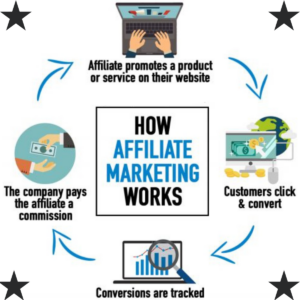Affiliate Marketing: A Comprehensive Guide

Affiliate marketing has emerged as a popular and effective strategy for businesses to expand their reach and for individuals to earn passive income. This performance-based marketing model hinges on collaboration between businesses (merchants) and independent marketers (affiliates). Here’s a detailed look into the world of affiliate marketing, its workings, benefits, and best practices.
What is Affiliate Marketing?
Affiliate marketing is a marketing arrangement where affiliates promote a merchant’s products or services. Affiliates earn a commission for every sale, lead, or action generated through their marketing efforts. This model benefits both parties: merchants get increased exposure and sales, while affiliates earn money based on their promotional performance.
How Does Affiliate Marketing Work?

1. Merchant: The business or individual that sells the product or service.
2. Affiliate: The marketer who promotes the merchant’s product.
3. Customer: The end-user who purchases the product through the affiliate’s promotion.
4. Affiliate Network: An intermediary that provides the infrastructure to track the affiliate’s performance and manage payments (optional).
The Process:
- Merchant Creates an Affiliate Program: The merchant decides on the commission structure, marketing materials, and tracking system.
- Affiliate Joins the Program: Affiliates sign up and receive unique tracking links or codes.
- Affiliate Promotes the Product: Through websites, blogs, social media, email marketing, and other channels.
- Customer Clicks on the Link: The customer is directed to the merchant’s website.
- Customer Makes a Purchase: The purchase is tracked, and the affiliate earns a commission.
Benefits of Affiliate Marketing
For Merchants:
- Cost-Effective: Pay only for actual performance (sales, leads).
- Increased Reach: Leverage affiliates’ audiences to reach new customers.
- SEO Benefits: High-quality backlinks from affiliates’ websites can improve search engine rankings.
- Scalability: Easily scale the marketing efforts without a significant increase in cost.
For Affiliates:
- Passive Income: Earn money continuously from evergreen content.
- Flexibility: Work from anywhere with an internet connection.
- Low Risk: No need to invest in product creation or inventory.
- Diverse Opportunities: Promote a wide range of products and services.
Best Practices for Affiliate Marketing
For Merchants:
- Choose the Right Affiliates: Partner with affiliates whose audience aligns with your target market.
- Offer Competitive Commissions: Ensure your commission rates are attractive to potential affiliates.
- Provide High-Quality Marketing Materials: Equip affiliates with banners, links, and content that are appealing and effective.
- Track Performance Accurately: Use reliable tracking software to monitor sales and leads accurately.
- Communicate Regularly: Maintain open communication with affiliates to build strong relationships and address any issues promptly.
For Affiliates:
- Choose Relevant Products: Promote products that align with your niche and audience interests.
- Create Valuable Content: Provide genuine reviews, tutorials, and recommendations that add value to your audience.
- Use Multiple Channels: Diversify your promotional efforts across websites, social media, email, and other platforms.
- Disclose Affiliate Relationships: Be transparent with your audience about your affiliate links to build trust.
- Analyze and Optimize: Continuously monitor your performance and optimize your strategies to improve results.
Challenges in Affiliate Marketing
For Merchants:
- Fraudulent Activities: Dealing with fraudulent clicks or sales.
- Affiliate Management: Finding and managing high-quality affiliates can be time-consuming.
- Tracking Issues: Ensuring accurate tracking of sales and leads.
For Affiliates:
- Competition: High competition in popular niches can make it difficult to stand out.
- Dependence on Merchant Policies: Changes in commission structures or terms can impact earnings.
- Traffic Generation: Building and maintaining consistent traffic to your promotional content.
Conclusion
Affiliate marketing offers a win-win solution for both merchants and affiliates. By understanding the dynamics of this model, implementing best practices, and staying aware of potential challenges, both parties can maximize their benefits. Whether you’re a business looking to expand your reach or an individual aiming to earn passive income, affiliate marketing provides a versatile and effective avenue to achieve your goals.
